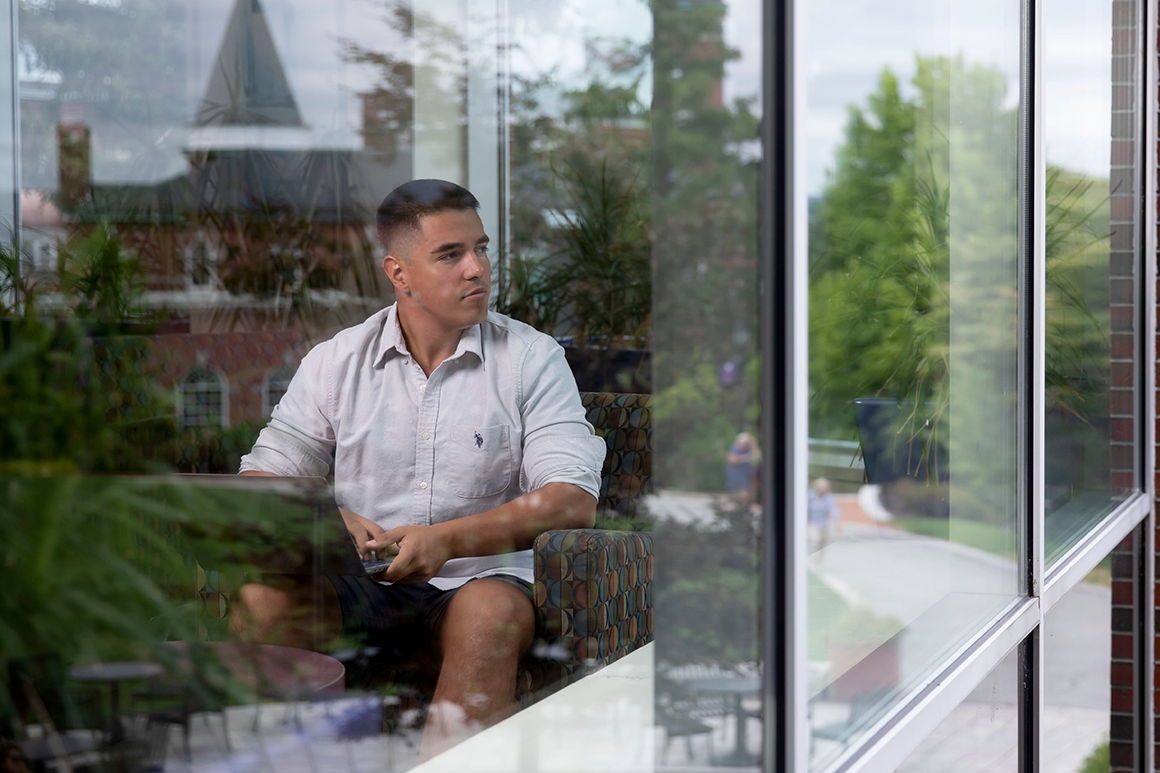
David Pritchard '23 is a political science and psychology major at the College of the Holy Cross. As part of this year's Charles S. Weiss Summer Research Program, the Longmeadow, Massachusetts, native is turning to social media to examine whether conversations on Twitter have become more polarizing since 2012.
What led you to do this research and what do you hope to learn or discover from it?
What started me down this direction was the first-ever political science course I took at Holy Cross: Principles of American Government with Professor Greg Burnep. And there was a section, probably my favorite chunk of the class, where we talked about this new development called affective political polarization, which was different from how people have been traditionally ideologically polarized. It's a venomous form of polarization, where people rally against the other side, more so than rallying together around their own interests.
This past semester, I took a seminar that discussed the politics of "us and them" with Professor Mark Freeman in the psychology department. That class further ignited my interest in looking at polarization and at why people are so divided about politics.
How do you plan on researching and what do you plan on looking at in terms of discovering more?
I want to look at a progression of polarization around significant political events over time. The 2012 election is where I'm likely to begin my research. I'll look at tweets from that period and then the Charlottesville rally in 2017, particularly the time period after President [Donald] Trump made the "good people on both sides" comments because that sparked a whole debate on Twitter, and then Jan. 6. I want to see if, over time, there is an increase not only in the number of polarizing tweets, but a shift in the tweets and the linguistics and rhetorical devices behind them.
What makes Twitter the best media for this project compared to Facebook, Instagram or LinkedIn?
Number one, the advanced search — that made it really easy to filter things out. I also think that Twitter became the mainstream form of political communication on social media. Not only just Trump's popularization of it, but there's also been a significant increase in how congresspeople, representatives and senators use Twitter, as well. Now almost every single member of Congress has an official Twitter account from which they message and broadcast to their constituents, which is different from, I think, almost any social media site.
Twitter is also one of my preferred forms of social media. It's easier and primarily a text-based platform. You can just strictly look at and analyze the language people are using and posting.
With text limits, Twitter often doesn't allow for nuanced conversation. How does this affect the polarization on the platform?
One study I found tested whether character limits produce more divisive or polarized interactions among users. They found out through the study that their hypothesis was correct. One of the solutions they presented in their conclusion of their paper said that increasing the character limit, or perhaps doing away with the character limit, would produce a healthier political discussion on the platform. So that's definitely something that people have not only hypothesized but also seem to have proven through their studies character limits and the brevity prevent you from engaging in a nuanced conversation.
It appears that Twitter, more than any other platform, encourages dialogue with people who don’t know each other. How does this play into the polarization?
A lot of people try to explain the phenomena of interacting with strangers on Twitter: People are drawn to talking to strangers within their own echo chambers and they are attracted by the things they like, the accounts they follow, who they decide to reply to or politicians to engage with and what messages they want to retweet. It's given me a new way to think about Twitter. Whenever I try and say, OK, well, maybe this is an example of someone really wanting to reach out and have a genuine deliberative conversation, I think back to this research and I think, OK, well, statistically speaking this echo chamber is more so the reality.
What do you hope to use this research for?
This is a big piece of what my thesis for next year is going to look like; it's laying the foundation. I hope that by the end of the Weiss program, I'm going to have the dataset portion completed of at least one of the events.
I'm assuming the first time gathering the data is going to be the hardest. Once I learn how to collect data like that, that's going to be what carries over into the fall and into the spring, where I am working on collecting the rest of that data and then analyzing it to produce some sort of meaningful contribution to this body of research with my year-long thesis.
Why is this topic important?
We're at a really fragile and really dangerous period in United States politics. The way we approach others in the world, the way we have interactions with strangers, whether it be online or offline, that's something that we need to shift rapidly.
From Obama to Trump: Holy Cross Student Examines Political Polarization on Twitter
As part of the Charles S. Weiss Summer Research Program, David Pritchard '23 looked into social media exchanges
Read Time
4 Minutes

